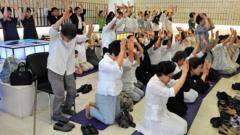The Unification Church, which has been present in Japan since the 1960s, has faced increasing scrutiny after the shocking assassination of Shinzo Abe in 2022. The man accused of Abe's murder claimed a deep resentment towards the church due to its alleged role in financially ruining his family. In light of this revelation, Japan's education and culture ministry called for the church's disbandment, accusing it of coercing its followers into significant financial contributions.
A Tokyo district court's ruling, while allowing the church to continue operating, will strip it of its tax-exempt status and mandate asset liquidation. The Unification Church, named after its South Korean founder Sun Myung Moon, plans to appeal the ruling, maintaining that its financial contributions from followers are legitimate parts of their religious practices.
Investigations into the church uncovered alarming practices where individuals reported being manipulated into purchasing costly items under the guise of safeguarding their spiritual health. Authorities interviewed nearly 200 purported victims who claimed exploitation by the organization.
Dating back to the 1960s, the Unification Church has long been controversial in Japan, particularly for its stance on marriage as integral to spiritual salvation and its signature mass wedding ceremonies. Since the events following Abe's assassination, around 200 former followers have sought compensation totaling 5.7 billion yen ($38.5 million) from the church.
The events surrounding the church have sparked national outrage, especially as investigations revealed its extensive connections to conservative lawmakers within Japan's ruling Liberal Democratic Party. An internal probe found that 179 of the party's 379 lawmakers had some level of engagement with the church, including attending gatherings and accepting financial aid, prompting the resignation of four cabinet ministers. The public response has highlighted the church's influence within the government, raising concerns about transparency and ethical conduct among Japan's political elite.
A Tokyo district court's ruling, while allowing the church to continue operating, will strip it of its tax-exempt status and mandate asset liquidation. The Unification Church, named after its South Korean founder Sun Myung Moon, plans to appeal the ruling, maintaining that its financial contributions from followers are legitimate parts of their religious practices.
Investigations into the church uncovered alarming practices where individuals reported being manipulated into purchasing costly items under the guise of safeguarding their spiritual health. Authorities interviewed nearly 200 purported victims who claimed exploitation by the organization.
Dating back to the 1960s, the Unification Church has long been controversial in Japan, particularly for its stance on marriage as integral to spiritual salvation and its signature mass wedding ceremonies. Since the events following Abe's assassination, around 200 former followers have sought compensation totaling 5.7 billion yen ($38.5 million) from the church.
The events surrounding the church have sparked national outrage, especially as investigations revealed its extensive connections to conservative lawmakers within Japan's ruling Liberal Democratic Party. An internal probe found that 179 of the party's 379 lawmakers had some level of engagement with the church, including attending gatherings and accepting financial aid, prompting the resignation of four cabinet ministers. The public response has highlighted the church's influence within the government, raising concerns about transparency and ethical conduct among Japan's political elite.





















